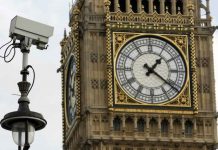“I feel abandoned” – end of restrictions poses stark choice for millions of clinically vulnerable Britons
By Sonia Elks
LONDON – (Thomson Reuters Foundation) – While most Britons have enjoyed a return to something like pre-pandemic life, teaching assistant and kidney transplant recipient Alex is still stuck deep in her own personal lockdown.
Each night, her husband strips off and dumps his clothes in the washer to minimise the risk of bringing home the COVID-19 virus – a threat that has barely diminished for immuno-supressed people like her for whom vaccines offer less protection.
Alex herself is signed off sick from her job due to the mental health impact of the pandemic. As Britain lifts most COVID-19 restrictions under a “live with the virus” policy, she sees no way back to her old life or even anything close to it.
“I feel abandoned,” said Alex, 40, who lives in the southern coastal region of Sussex and asked not to give her real name due to the potential impact on her job.
“I can’t actually see where I’m going to be able to get gainful employment again.
“It’s hard because obviously we’re just trying to juggle keeping ourselves alive, and trying to work out the financial impact of it as well.”
England is among a number of European countries dropping or easing pandemic restrictions in the wake of mass vaccine rollouts, to the alarm of some health experts.
Prime minister Boris Johnson has scrapped all legal restrictions on containing the virus, with a requirement to self-isolate after testing positive dropped from Feb. 24.
But medically vulnerable Britons are even more concerned about further changes to come in April, when isolation will no longer even be an official recommendation, and the country will also end free mass-testing.
Scotland and the other devolved nations can set their own COVID-19 policies, but all are tightly linked by travel and trade, while mass testing was previously funded centrally.
HARD CHOICES
Johnson says that months of restrictions to counter the virus had curtailed personal freedoms and taken a “heavy toll” on the economy, society and mental health.
But for people with underlying health conditions, easing those rules and ending the mass testing will now restrict their options and make it harder to earn a living.
“This new plan simply does not go far enough to protect those most vulnerable to the virus,” said Lynda Thomas, chief executive at the Macmillan Cancer Support charity.
Some 3.7 million people were identified as “clinically extremely vulnerable” to COVID-19 in England alone.
Others, such as Scottish folk singer Iona Fyfe, say they are not even officially counted, despite running a high risk.
Fyfe, 24, was diagnosed three years ago with fibromyalgia, a poorly-understood chronic pain condition linked to fatigue, which some researchers say may be immune related.
“I genuinely need to start my career again,” she told the Thomson Reuters Foundation in a telephone call.
“It’s really stressful because I want to get back to work. But I don’t want me to get sick … or for people that come to my gig to get sick.”

So Fyfe just hopes sick fans will stay away, after deciding against requiring proof of vaccination or a negative test at a post-pandemic gig as she “wasn’t sure how that would go down”.
Bosses are also facing tough questions as they work out their responsibilities towards workers.
“Employers owe employees, including medically vulnerable employees, a duty of care. So what every employer has to actively consider is how they meet that duty,” said Lucy Lewis, a partner at
Lewis Silkin law firm specialising in employment.
The top question she is asked by firms: should business pay to mass-test its workers once the free scheme ends?
Opting to live with COVID rather than fight it marked “a significant step towards normality returning”, Matthew Fell, chief policy director at business group the Confederation of British Industry, said in a written statement.
However, he said firms backed an extension to the free tasting programme, and employers needed more clarity about how to handle issues such as sick pay and employer liability.
The Trades Union Congress, an umbrella body for unions, has called for higher statutory sick pay and an end to rules that bar claims for the first three days off sick to ensure low-paid workers are not forced to report for duty while ill.
WIDER IMPACTS
Much will depend on how guidance is interpreted given firms will now write their own rules, said Azeem Majeed, a professor of primary care and public health at Imperial College London.
Already, he estimated, more than half of COVID-19 cases go undiagnosed with the infected continuing to mix.
“If people are sensible – isolate if tested as positive or if they have symptoms – then it will limit the effects on vulnerable people,” he said.
It is not just the vulnerable who are affected, but their partners and children, too. Additionally, any house mate of a person at risk must weigh the risk of bringing home the virus against losing their livelihood.
Julie, a stay-at-home mum in Essex who asked not to give her real name, said her whole family’s future was under threat.
Her husband works in finance and has a heart condition that weakened his immunity and left him vulnerable to the virus.
“He’s the sole provider for our family, so he has to go to work,” said Julie, who said her husband was largely working from home but still had to commute in for some meetings.
“It’s so short sighted, because if something happens to him, then we’re three dependents. And not just that – we’re three ruined lives,” she said.
“My children deserve their dad, and I deserve my husband.”
While some are choosing to take measured risks and hope for the best, others say the change in policy has already permanently upended their lives.
Classroom assistant Alex, who had been training to become a fully-fledged teacher, said she will now have to abandon that path and look for work she can do remotely or alone.
“The majority of work is going to be unsafe, it will be very limited on what I can actually do,” she said.
Reporting by Sonia Elks @soniaelks; Editing by Lyndsay Griffiths. Credit the Thomson Reuters Foundation.







